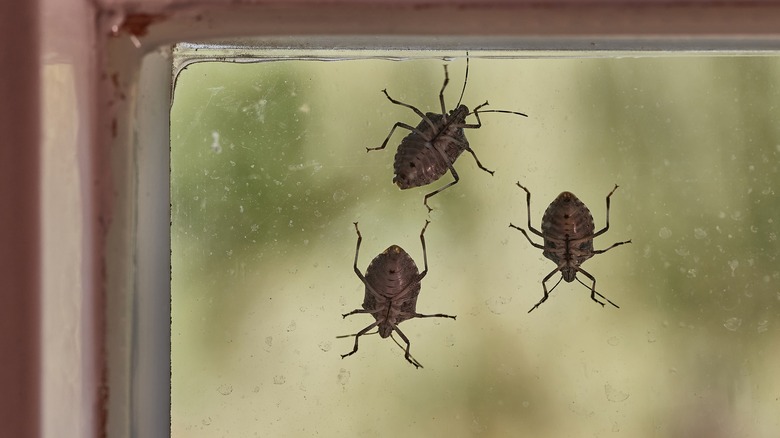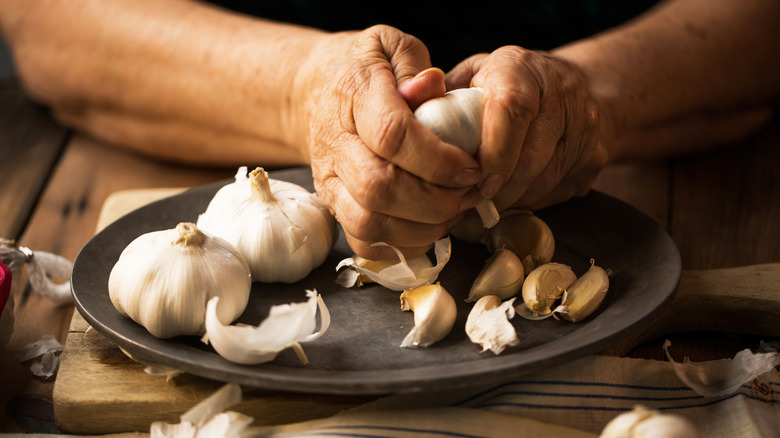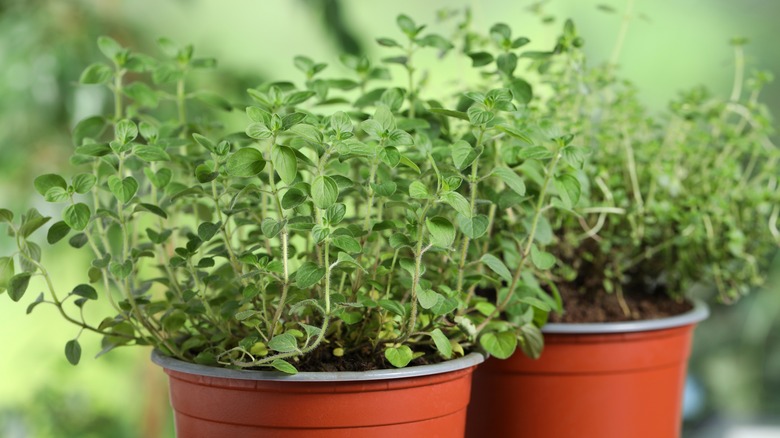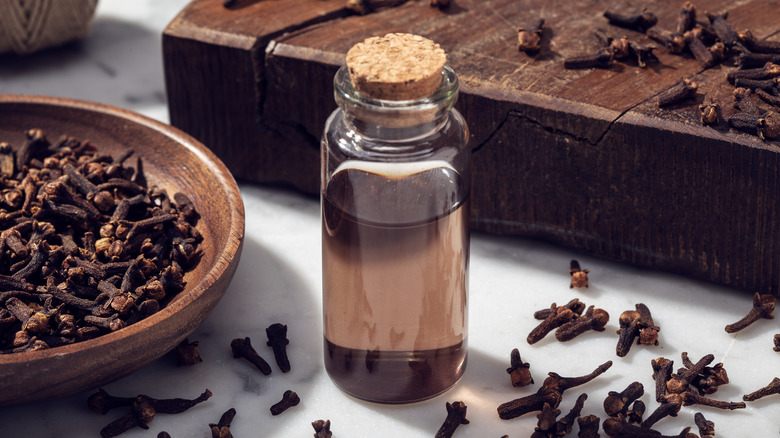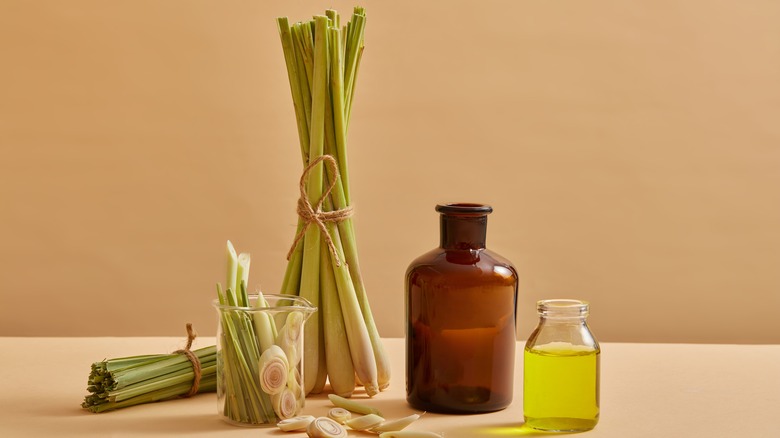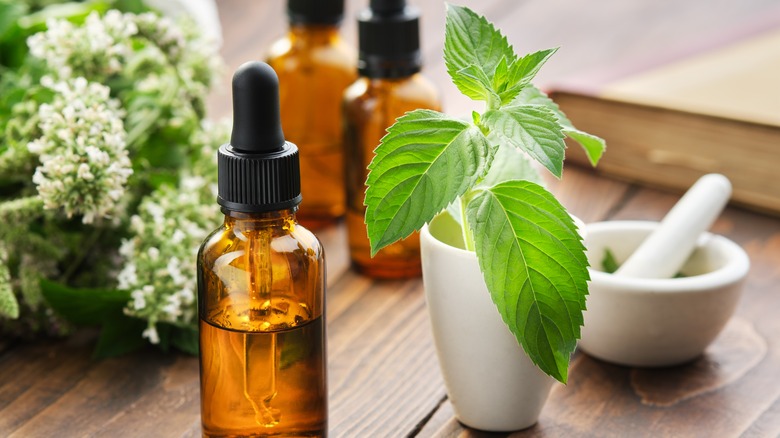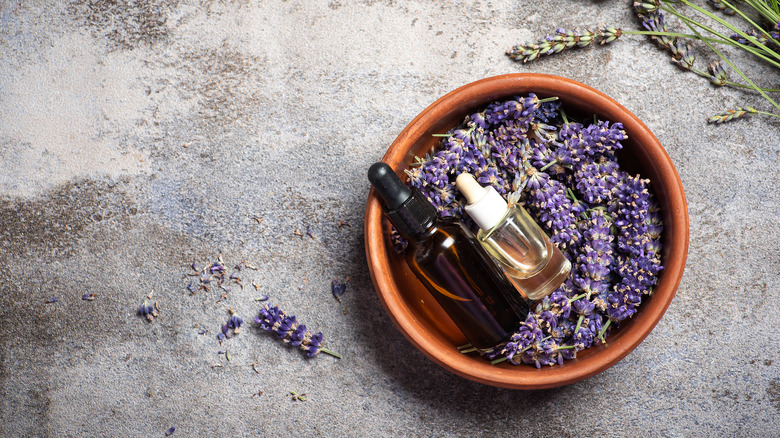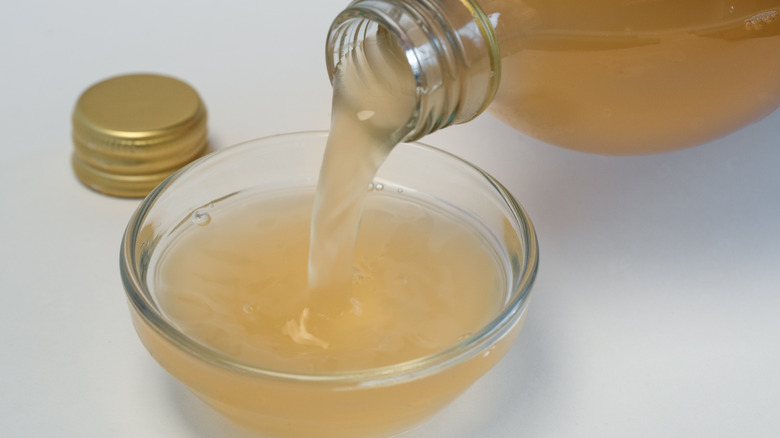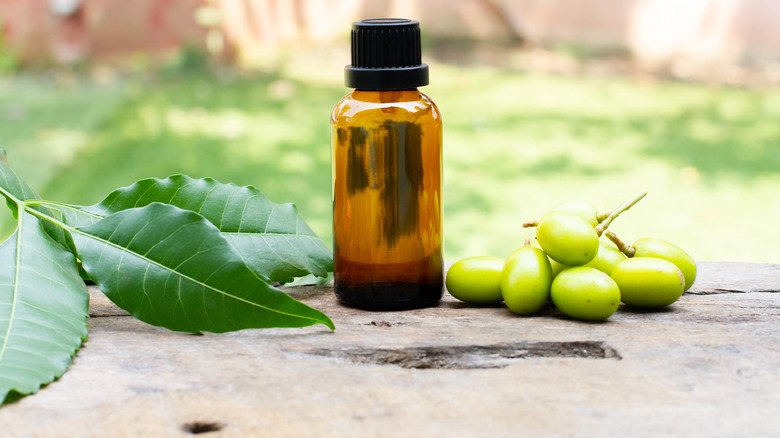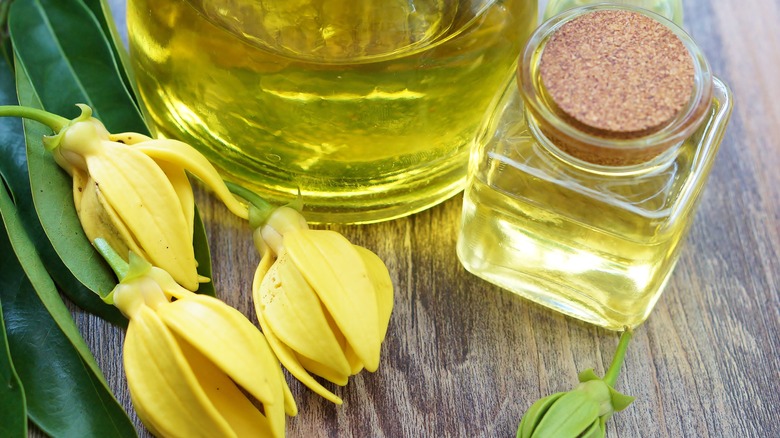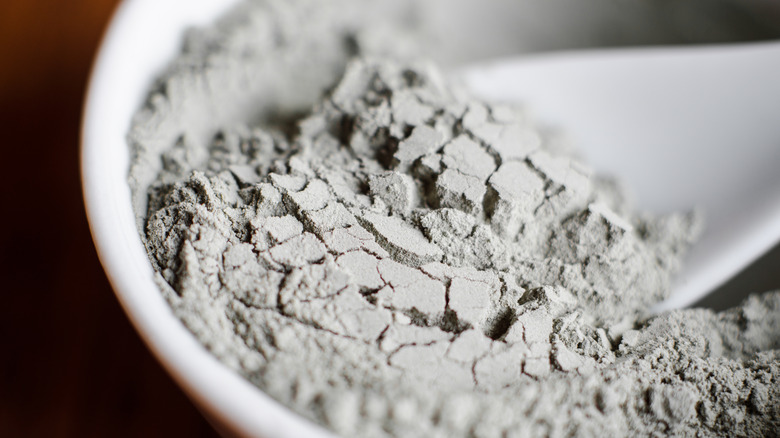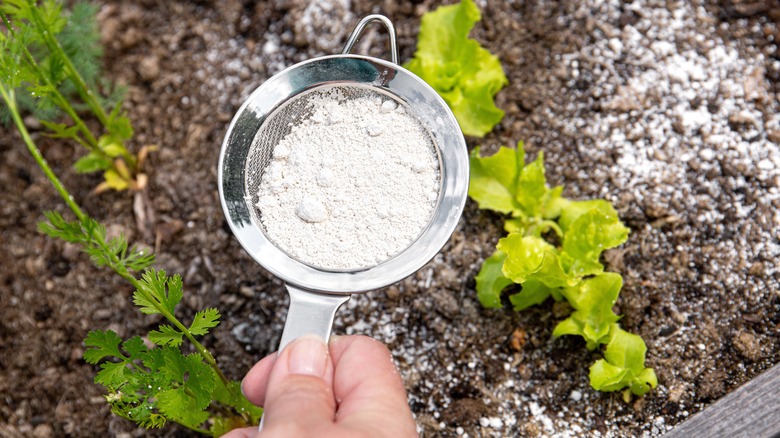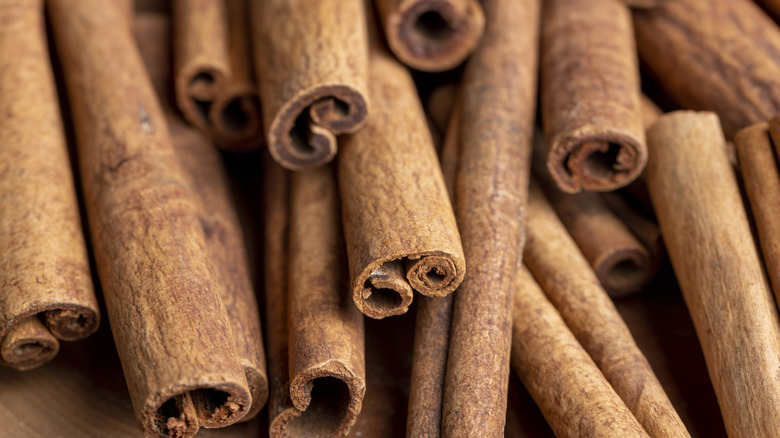Natural Ingredients You Should Use To Keep Stink Bugs Out Of Your House
In the eternal battle to maintain a pest-free home, the invasion of stink bugs can be particularly vexing. These tiny creatures are most likely to become a problem for homeowners once outdoor temperatures begin to drop in the fall. That's when stink bugs begin searching for a warmer domain. While you can squish any stink bugs you come across within the confines of your home's four walls, doing so will release the pests' infamous foul scent.
Taking measures to keep stink bugs out of your house to begin with is a better strategy than dealing with a full-blown indoor infestation, since once your home is infested, only professionals can eradicate the problem. Although chemical pesticides are readily available for this purpose, you may prefer natural solutions if you don't want harsh chemicals lingering around your home. While the aromatic scent of lemongrass essential oil, the abrasive power of diatomaceous earth, and the versatile properties of vinegar may help in preventative efforts, keep in mind they won't stop an infestation of these smelly insects.
Repel stink bugs using garlic
If you've ever cooked with garlic, you know how pungent it can be. Once garlic has been crushed, it releases the compound allicin. This compound breaks down even further into several other sulfur-containing compounds, which produce the powerful odor you've come to expect from the herb. Just as people are sensitive to garlic, so are bugs. Pest control experts sometimes recommend this herb as a preventive measure, although it's best combined with another method for better effectiveness.
To create your garlic bug deterrent, pour 2 cups of water in a spray bottle. Add 4 teaspoons of garlic powder and give the bottle a shake. Spray the solution around the perimeter of your home, or anywhere you've spotted a congregation of stink bugs. It's also a good idea to spray around windows and doors, as this is often where the pests find entry into your home. If you'd rather use fresh garlic, you'll need to puree three bulbs in 4 cups of water and let it sit overnight before using it as a repellent spray. It's important to note that while garlic may repel stink bugs, natural ingredients often aren't effective against severe infestations.
Keep pests at bay with oregano and thyme
Garlic is not the only item in your pantry that may work to prevent stink bug infestations. A 2011 study conducted by the Society of Chemical Industry evaluated the effects of both oregano and thyme on the southern green stink bug. Although the oils of both herbs repelled nymphs and adults, the results showed that thyme essential oil was a bit more effective. So, check your stock for thyme essential oil, which is preferred. If you don't have it, you can use the oregano essential oil.
Create your homemade insecticide by filling a spray bottle with 2 cups of water. Add ¼ teaspoon of thyme essential oil and 3 drops of a liquid dish soap. Shake the spray bottle to combine the ingredients. Use the solution directly on the stink bugs, as well as in areas in and around the home where you wish to repel the pests.
Deter stink bugs with clove oil
Another common kitchen plant that also doubles as an insect repellent is cloves. This flavorful seasoning has a spicy scent that can be quite robust. A 2013 article in the Journal of Applied Entomology reported on a study that showed clove oil had a high success rate for deterring brown marmorated stink bugs from going after a bait station that was filled with a known attractant. In fact, results were equally as favorable for both nymphs and adults. That makes it an excellent option for use in a home setting.
To repel stink bugs using cloves, you'll want to fill a spray bottle with 2 cups of water. Add 10 drops of clove oil and give the bottle a shake. Use this formula to spray the outside of your home or garden. As with most homemade insecticides, you'll need to reapply the spray any time it rains.
Note: Clove oil is not safe for use around pets. Pet owners will need to utilize one of the other methods for deterring stink bugs.
Make your own lemongrass oil repellent
Lemongrass is another essential oil that is known to repel stink bugs. It features citrus and earthy notes that are quite pleasant to most humans, which means when you use it, you'll enjoy both the pest-deterrent properties as well as the attractive aroma. Just like clove oil, lemongrass oil was shown in studies to successfully repel stink bugs in the nymph and adult stages, enjoying a high effectiveness rate.
Creating your own lemongrass oil repellent is also a breeze. Simply add 2 cups of water to a spray bottle and drip in 10 drops of lemongrass essential oil. Screw on the spray wand and give the bottle a good shake to combine the ingredients. Apply around windows, doors, or anywhere in the garden you wish to keep free of stink bugs. If you have any homemade solution left over, consider using it to freshen up the air in your home!
Prepare a spearmint essential oil deterrent
Who doesn't love the fresh cool scent of spearmint? Apparently, stink bugs! They are strongly repelled by this odor, according the same 2013 article in the Journal of Applied Entomology. Spearmint is made up of over 50% carvone, which gives the plant its well-known aroma. As an added bonus, per the Cornell Cooperative Extension, experts reveal that spearmint oil has been found effective against ants, mosquitoes, and spider mites. In fact, spearmint oil is approved for use in pesticides due to its effectiveness. In the Cornell study, spearmint oil was highly effective, repelling over 95% of stink bugs from attractant traps.
Turn your spearmint essential oil into a DIY stink bug deterrent by mixing 10 drops of oil with 2 cups of water. This is best done in a spray bottle, as it makes application of the repellent much easier. Use the spearmint solution around the perimeter of the home to keep wandering stink bugs from crossing over the threshold from outdoors to indoors. Reapply the deterrent as needed, or after a rainfall, as this would wash the oil solution away.
Create a lavender oil spray to repel stink bugs
Lavender is one of those plants that gives off a floral scent that is quite calming to humans but repugnant to pests. It is one of the few essential oils that may repel stink bugs. Other academics and exterminators also recommend the use of lavender essential oil as a natural repellent, although there isn't any scientific proof that it works. Still, it's worth a try if you don't have any of the aforementioned essential oils on hand.
Mixing 10 drops of lavender essential oil with 2 cups of water in a spray bottle is the best way to create your homemade stink bug repellent. The solution can be used immediately along the outside of the house or sprayed directly on any plants near the home, such as foundation plants or flowers in window boxes. For better results, consider using this method in conjunction with one of the other deterrents listed.
Turn household vinegar and soap into an insecticide
Vinegar is both a deterrent and a natural insecticide, and is especially effective when combined with a liquid dish soap. It's the taste and smell of the acetic acid within the vinegar that pests find repulsive. Since household vinegar only contains 5% acetic acid, you should use vinegar with a 10%, 30%, or 50% acidic acid potency for more reliable pest control. Of course, experts point out that this stink bug repellent isn't the best option for serious infestations and should be used alongside a secondary control method.
Mix 1 cup of apple cider vinegar with 3 cups of water. Add a few drops of liquid dish soap and spray around the perimeter of your home. Use a vinegar soap trap in garden settings instead of a spray, as vinegar can burn the leaves of plants. Simply pour the contents of the spray bottle in a shallow dish and set it in an area that stink bugs frequent. You can also set UV lights nearby to help attract stink bugs to your vinegar soap trap. When the bugs fall in the trap, they will drown.
Prepare a neem oil insecticide to eradicate stink bugs
Neem oil is another natural ingredient often used as an insecticide to kill pests, such as stink bugs. Once a stink bug consumes neem oil, it loses its appetite, which leads to death by starvation. One 2016 study published in the Scientific Reports showed that the higher the concentration of neem oil, the more favorable the results. Control was seen in all stages from nymph to adult.
Pick up a bottle of neem oil that is listed as 100% pure and cold pressed, as this has the highest concentration of azadirachta. Place 1 ½ teaspoons of neem oil, 4 cups of water, and ½ teaspoon of liquid dish soap in a spray bottle and mix thoroughly. Spray directly on the plants near and around your home. Reapply every two weeks throughout the months of March through September, as this is considered stink bug season.
Note: Neem oil is toxic to aquatic life, so avoid using it near ponds and other bodies of water.
Deter bugs with a homemade ylang ylang essential oil spray
A ylang ylang essential oil spray works to repel stink bugs wherever it is applied, as studies show it is just as effective as lemongrass, clove, and spearmint essential oils on both nymphs and adults. Perhaps this is because of its strong floral scent, which is often used in women's perfume and skincare products. Once homeowners prepare their ylang ylang deterrent spray, they can use it both indoors and outdoors for pest control and to add a pleasant fragrance to the air.
Pour 2 cups of water in a spray bottle. Add 20 drops of ylang ylang essential oil to the bottle and shake to combine. Administer the spray around any entryways into your home, as well as in your garden. Reapply once the scent dies down, or after a rainfall in order to continue to repel the stink bugs.
Turn kaolin clay into a powerful plant protectant
While kaolin clay won't directly prevent stink bugs from entering your home, you can use it to protect your plants from being bothered by the pests. The clay can be transformed into a spray that, when applied to a plant's leaves, provides a covering that makes feeding on the plant less desirable. Once your habitat no longer appeals to the stink bugs, they'll search elsewhere for a place to feed and shelter.
To transform the clay into a plant protectant spray, you'll need to fill a spray bottle with 2 cups of hot water. Add 2 tablespoons of kaolin clay and mix until dissolved. Coat plant leaves thoroughly with the solution. Since kaolin clay is natural and safe, you can use it on the leaves of vegetable crops, in addition to your other plants. Reapply as needed or after rain has washed away any previous applications.
Eliminate pests with diatomaceous earth
Instead of repelling stink bugs, you can eliminate them with diatomaceous earth. This natural powder is made up of sharp granules that pierce the exoskeleton of most bugs that come into contact with it, including stink bugs. Once the insect's exoskeleton has been damaged, it can no longer retain fluids, which results in the pest dying from dehydration.
Make sure you purchase a diatomaceous earth labeled for use as an insecticide. It's odorless, so you don't have to worry about it stinking up your backyard. Even though the dust won't harm you when you touch it, you'll need to wear a mask during application so that you don't breathe it in. Sprinkle the diatomaceous earth around the perimeter of your home, underneath doorways, across windowsills, and any other locations where the pests would be able to enter your dwelling. If you'd like, you can also apply the dust around the base of the plants in your garden.
Sprinkle cinnamon around the perimeter of your home
Cinnamon not only adds flavor to French toast and creates a scent that is reminiscent of fall, but the common spice also works to repel stink bugs. Cinnamon is approved for use as an ingredient in pesticides, as the compounds cinnamaldehyde and eugenol are successful in deterring insects.
To prevent stink bugs from entering the house, sprinkle cinnamon in powder form around the home's foundation and along any stairs, patios, or porches. In addition to sprinkling cinnamon powder, there are two other viable options to repel stink bugs with this spice. You can bunch whole sticks of cinnamon together and set them around the base of your home or in window planters. Additionally, you can create a cinnamon essential oil spray using 2 cups of water and 10 drops of oil. Spray the repellent anywhere you'd like to keep clear of stink bugs.
